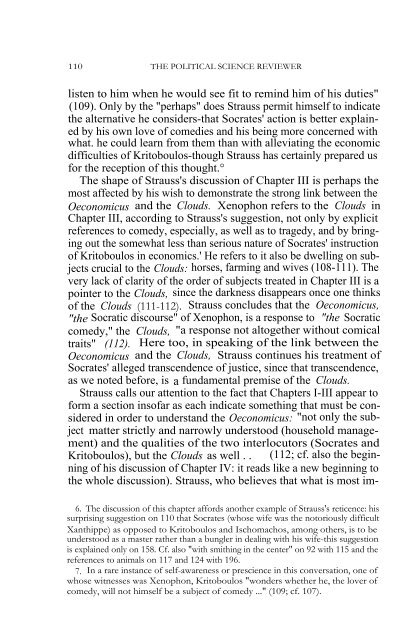Strauss on Xenophon's Socrates Xenophon's Socratic Discourse: An ...
Strauss on Xenophon's Socrates Xenophon's Socratic Discourse: An ...
Strauss on Xenophon's Socrates Xenophon's Socratic Discourse: An ...
You also want an ePaper? Increase the reach of your titles
YUMPU automatically turns print PDFs into web optimized ePapers that Google loves.
110 THE POLITICAL SCIENCE REVIEWER<br />
listen to him when he would see fit to remind him of his duties"<br />
(109). Only by the "perhaps" does <str<strong>on</strong>g>Strauss</str<strong>on</strong>g> permit himself to indicate<br />
the alternative he c<strong>on</strong>siders-that <strong>Socrates</strong>' acti<strong>on</strong> is better explained<br />
by his own love of comedies and his being more c<strong>on</strong>cerned with<br />
what. he could learn from them than with alleviating the ec<strong>on</strong>omic<br />
difficulties of Kritoboulos-though <str<strong>on</strong>g>Strauss</str<strong>on</strong>g> has certainly prepared us<br />
for the recepti<strong>on</strong> of this thought.°<br />
The shape of <str<strong>on</strong>g>Strauss</str<strong>on</strong>g>'s discussi<strong>on</strong> of Chapter III is perhaps the<br />
most affected by his wish to dem<strong>on</strong>strate the str<strong>on</strong>g link between the<br />
Oec<strong>on</strong>omicus and the Clouds. Xenoph<strong>on</strong> refers to the Clouds in<br />
Chapter III, according to <str<strong>on</strong>g>Strauss</str<strong>on</strong>g>'s suggesti<strong>on</strong>, not <strong>on</strong>ly by explicit<br />
references to comedy, especially, as well as to tragedy, and by bringing<br />
out the somewhat less than serious nature of <strong>Socrates</strong>' instructi<strong>on</strong><br />
of Kritoboulos in ec<strong>on</strong>omics.' He refers to it also be dwelling <strong>on</strong> subjects<br />
crucial to the Clouds: horses, farming and wives (108-111). The<br />
very lack of clarity of the order of subjects treated in Chapter III is a<br />
pointer to the Clouds, since the darkness disappears <strong>on</strong>ce <strong>on</strong>e thinks<br />
of the Clouds (111-112). <str<strong>on</strong>g>Strauss</str<strong>on</strong>g> c<strong>on</strong>cludes that the Oec<strong>on</strong>omicus,<br />
"the <strong>Socratic</strong> discourse" of Xenoph<strong>on</strong>, is a resp<strong>on</strong>se to "the <strong>Socratic</strong><br />
comedy," the Clouds, "a resp<strong>on</strong>se not altogether without comical<br />
traits" (112). Here too, in speaking of the link between the<br />
Oec<strong>on</strong>omicus and the Clouds, <str<strong>on</strong>g>Strauss</str<strong>on</strong>g> c<strong>on</strong>tinues his treatment of<br />
<strong>Socrates</strong>' alleged transcendence of justice, since that transcendence,<br />
as we noted before, is a fundamental premise of the Clouds.<br />
<str<strong>on</strong>g>Strauss</str<strong>on</strong>g> calls our attenti<strong>on</strong> to the fact that Chapters I-III appear to<br />
form a secti<strong>on</strong> insofar as each indicate something that must be c<strong>on</strong>sidered<br />
in order to understand the Oec<strong>on</strong>omicus: "not <strong>on</strong>ly the subject<br />
matter strictly and narrowly understood (household management)<br />
and the qualities of the two interlocutors (<strong>Socrates</strong> and<br />
Kritoboulos), but the Clouds as well . . (112; cf. also the beginning<br />
of his discussi<strong>on</strong> of Chapter IV: it reads like a new beginning to<br />
the whole discussi<strong>on</strong>). <str<strong>on</strong>g>Strauss</str<strong>on</strong>g>, who believes that what is most im-<br />
6. The discussi<strong>on</strong> of this chapter affords another example of <str<strong>on</strong>g>Strauss</str<strong>on</strong>g>'s reticence: his<br />
surprising suggesti<strong>on</strong> <strong>on</strong> 110 that <strong>Socrates</strong> (whose wife was the notoriously difficult<br />
Xanthippe) as opposed to Kritoboulos and Ischomachos, am<strong>on</strong>g others, is to be<br />
understood as a master rather than a bungler in dealing with his wife-this suggesti<strong>on</strong><br />
is explained <strong>on</strong>ly <strong>on</strong> 158. Cf. also "with smithing in the center" <strong>on</strong> 92 with 115 and the<br />
references to animals <strong>on</strong> 117 and 124 with 196.<br />
7. In a rare instance of self-awareness or prescience in this c<strong>on</strong>versati<strong>on</strong>, <strong>on</strong>e of<br />
whose witnesses was Xenoph<strong>on</strong>, Kritoboulos "w<strong>on</strong>ders whether he, the lover of<br />
comedy, will not himself be a subject of comedy ..." (109; cf. 107).

















